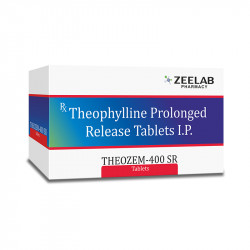Theophylline
Theophylline is a medication primarily used to treat respiratory conditions such as asthma, chronic obstructive pulmonary disease (COPD), and other lung disorders. It works by relaxing the muscles around the airways, making it easier to breathe. Theophylline is classified as a bronchodilator and is often prescribed to individuals with difficulty breathing due to narrowed or inflamed airways. It may also be used to manage chronic symptoms of asthma and COPD.
Uses of Theophylline
- Treats asthma and chronic obstructive pulmonary disease (COPD)
- Helps relieve shortness of breath and wheezing
- Improves lung function and reduces inflammation in the airways
- Can be used for other breathing problems as prescribed by a doctor
How Theophylline Works
Theophylline works by relaxing and widening the muscles of the airways in the lungs. This bronchodilation allows for better airflow, making it easier to breathe. It also reduces the inflammation in the airways, preventing constriction and improving lung function. Theophylline helps to prevent asthma attacks and exacerbations of chronic respiratory conditions by keeping the airways open and clear.
Benefits of Theophylline
- Relieves symptoms of asthma and COPD
- Improves lung function and increases airflow
- Reduces the frequency of asthma attacks
- Helps manage chronic respiratory symptoms
- Can be used as a long-term treatment for respiratory conditions
How to Take Theophylline
Theophylline is typically taken orally in the form of tablets, capsules, or liquid. It should be taken as prescribed by your healthcare provider, usually once or twice a day. Be sure to follow the prescribed dosage carefully to avoid side effects. The dosage may vary based on your specific condition, age, and overall health. It is important to take Theophylline at the same time each day for best results. Never exceed the prescribed dose without consulting your doctor.
Type of Dosage Available
- Tablets
- Capsules
- Oral solution
Side Effects of Theophylline
- Common side effects: Nausea, vomiting, headache, insomnia, irritability
- Severe side effects: Rapid heart rate, seizures, severe nausea/vomiting, breathing difficulties, chest pain
Safety Advice
- Consult your doctor before taking Theophylline if you have a history of heart problems or seizures
- Do not take Theophylline if you are allergic to it or any other components of the medication
- Inform your doctor of all other medications you are taking, as drug interactions can affect Theophylline’s effectiveness
- Avoid consuming caffeine or other stimulants as they may increase the risk of side effects
- Monitor blood levels regularly as Theophylline requires careful dosing to avoid toxicity
Frequently Asked Questions (FAQs)
Q: How long does it take for Theophylline to work?
A: Theophylline usually starts to work within a few hours of taking it, but it may take a few days to notice significant improvements in breathing.
Q: Can Theophylline be taken with other medications?
A: It is important to consult your healthcare provider before combining Theophylline with other medications, as certain drugs can interact with it.
Q: Are there any dietary restrictions while taking Theophylline?
A: Limit the intake of caffeine and other stimulants while taking Theophylline, as they may increase the risk of side effects like jitteriness or rapid heart rate.
Download India's most affordable pharmacy app
- Compare with medicine prices
- Save upto 90% on your medicine bills

Temperature Controlled storage and delivery

Regular Sanitization

Disinfected Packaging















 Added!
Added!